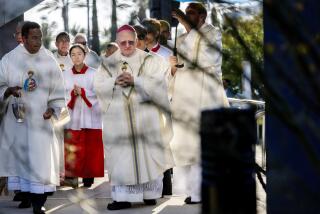Supreme Court Lets Stand Reversal of Church Libel Case
- Share via
SAN FRANCISCO — The state Supreme Court on Thursday let stand a ruling by an appeal court in Los Angeles that gives churches and ministers broad constitutional protection against libel suits for statements they make involving religious doctrine.
Over two dissents, the justices refused to hear a challenge to a state Court of Appeal decision last December overturning a $1.26-million defamation award against the Worldwide Church of God and church officials.
The appeal court held that to recover damages, a plaintiff must show the statements were made with knowledge that they were false or with “reckless disregard” for the truth--the same standard set for suits by public figures against news organizations in a landmark 1964 U.S. Supreme Court ruling.
The state appellate panel, giving even wider protection to church officials, said its decision applied whether the plaintiffs were public or private figures.
Right to Protect
The court said in this case a citizen’s right to protect his good name must yield to the constitutional right of free exercise of religion.
The panel, in an opinion by retired Appellate Justice James H. Hastings, sitting temporarily in the case, noted that the statements were made during an explanation of church doctrine.
“The First Amendment mandated a jealous guarding of religious practices unless it endangers a paramount interest of the state,” he said. “The holding we have articulated strikes an appropriate balance. . . .”
The case arose from a dispute between Raymond McNair, a church minister, and his former wife, Leona McNair, after their divorce in 1976. In 1979, at a convention of 1,000 ministers and their wives, Roderick C. Meredith, a church official, cited the McNairs’ divorce as a justifiable example of “desertion by an unconverted mate.”
Meredith noted in a 3 1/2-hour speech that Leona McNair had left the church, had cursed her former husband and become “as hateful as a human being could be.”
“I mean she departed so far, that she is one of the major enemies of God’s Church in Southern California and remains so to this day,” he said.
Emotional Distress
Leona McNair later was told about the speech by a friend she met at the supermarket. She brought suit against the church, Meredith and other officials for libel, slander and intentional infliction of severe emotional distress.
A Superior Court jury in Pasadena awarded the woman $260,000 in compensatory damages and $1 million punitive damages. The church appealed and won a ruling from the appellate court overturning the award.
In a petition for review to the state Supreme Court, lawyers for McNair argued that the appeal panel gave churches more protection than warranted, “unduly and unnecessarily” impairing the state’s interest in protecting the reputation of its citizens.
The attorneys contended that church doctrine could have been explained without mention of McNair by name.
The justices rejection of the appeal came in a brief order signed by Chief Justice Malcolm M. Lucas. Justices Stanley Mosk and Allen E. Broussard voted to review the case.
Antony Stuart of Los Angeles, an attorney for McNair, said an appeal to the U.S. Supreme Court “will be under very serious consideration.”
“The Court of Appeal basically extended to anyone, who is a ‘duly authorized minister’ explaining church doctrine, more protection than is granted the news media,” Stuart said. “My client is very concerned about the effects of this decision on other victims like her.”
Perform Duties
In another action Thursday, the court refused to hear a challenge by Los Angeles County authorities to an appeal court ruling that Beverly Hills Municipal Judge Charles Boags could not be criminally prosecuted for willful failure to perform his duties. Boags was accused of improperly suspending fines on more than 200 parking tickets issued to cars driven by his son or his son’s friends.
A state Court of Appeal panel in Los Angeles ruled that allowing such a prosecution, based on Boags’ alleged failure to disqualify himself from cases where he had a conflict of interest, could violate the constitutional separation of powers. Prosecutors could bring failure to perform duty charges for such trivial matters as failure to maintain order in the court, the appeal panel said.
However, the court left intact a separate charge accusing Boags of conspiring to obstruct justice, a misdemeanor punishable by a maximum of one year in jail and a $10,000 fine.
The ruling also does not affect any investigation conducted by the State Judicial Performance Commission, a watchdog agency that is permitted to seek removal or lesser punishment by the state Supreme Court for misconduct by judges.
Deputy Dist. Atty. Arnold T. Guminski said Thursday’s action would not significantly affect the prosecution against Boags.
“This does not weaken the case,” he said. “We still have the other charge.”
More to Read
Sign up for Essential California
The most important California stories and recommendations in your inbox every morning.
You may occasionally receive promotional content from the Los Angeles Times.










